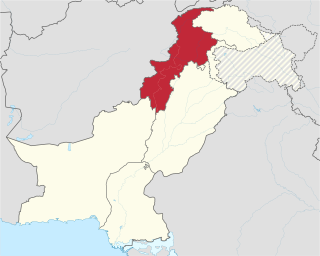
The 2009 Karachi bombing or Ashura attack took place on 28 December 2009 inside a Shia procession commemorating the day of Ashura, at Muhammad Ali Jinnah Road, Karachi, Pakistan. Ashura is the holiest of days for followers of Shia Islam and marks the anniversary of the death of Hussain, grandson of the Islamic prophet Muhammad, who was killed at the battle of Karbala in 680. At least 30 people were initially reported to have been killed, later figures revealed even more deaths while dozens were left injured in the wake of the attack. The attacker marched amongst the procession with tens of thousands of people attending the march. There is some speculation amongst officials as to whether the nature of the blast was that of a suicide attack or a remotely detonated or planted bomb.
This is a list of terrorist attacks in Pakistan in the calendar year 2011.
In 2008, Pakistan saw 40 terrorist attacks, which caused 154 fatalities and 256 injuries.
In 2009, Pakistan suffered 50 terrorist, insurgent and sectarian-related incidents that killed 180 people and injured 300.

The 2012 Khyber Agency bombing occurred on 10 January 2012, when a bomb exploded near a petrol pump in the town of Jamrud near the Afghan border in Khyber Agency of the Federally Administered Tribal Areas (FATA) of Pakistan. The bombing killed at least 30 people while 78 others were injured.
This is a list of terrorist incidents in Pakistan in 2012. Pakistan has faced numerous attacks by insurgents as a result of the ongoing War in North-West Pakistan by the Pakistani military against militant groups, part of the War on Terror. At the same time, there have also been numerous drone attacks in Pakistan carried out by the United States which exclusively target members of militant groups along the Afghan border regions.

The 2012 Rahim Yar Khan bombing occurred on 15 January 2012, when a remote-controlled bomb exploded during a Shi'a Muslim procession in the city of Rahim Yar Khan in the southern region of Punjab province, Pakistan. Eighteen people were killed and dozens other injured, some critically, as a result of the attack.
This is a list of terrorist incidents in Pakistan in 2016. Pakistan was the 10th most dangerous country by criminality index in 2016.

On 29 December 2015, a suicide bomber detonated his explosives in the front entrance of a regional branch of the National Database and Registration Authority, which is responsible for issuing ID cards in northwestern city of Mardan, Pakistan. The blast killed 26 people and more than 50 were wounded. Leader of Jamaat-ul-Ahrar, a faction of the Tehrik-i-Taliban Pakistan claimed responsibility for the attack.
On 16 September 2016, a bombing in a mosque left 36 people dead and 34 injured. The bombing comes only a few days after another one that killed at least 14 people and wounded 60.
Terrorist incidents in Pakistan in 2017 include, in chronological order:
Operation Radd-ul-Fasaad is a codename of a combined military operation by the Pakistani military in support of local law enforcement agencies to disarm and eliminate the terrorist sleeper cells across all states of Pakistan, started on 22 February 2017. The operation is aimed to eliminate the threat of terrorism, and consolidating the gains of Operation Zarb-e-Azb which was launched in 2014 as a joint military offensive. It is further aimed at ensuring the security of Pakistan's borders. The operation is ongoing active participation from Pakistan Army, Pakistan Air Force, Pakistan Navy, Pakistan Police and other Warfare and Civil Armed Forces managed under the Government of Pakistan. More than 375,000 operations have been carried out against terrorists so far. This operation has been mostly acknowledged after Operation Zarb e Azb.
On 12 May 2017, a suicide bombing targeted the convoy of the Deputy Chairman of the Senate of Pakistan, Abdul Ghafoor Haideri, a JUI (F) member, on the N-25 National Highway in Mastung District, Balochistan, Pakistan. At least 28 people were killed; 40 others were injured, including the Senator. The Islamic State of Iraq and the Levant claimed responsibility for the attack. The attack was an unsuccessful attempt to assassinate Haideri.
On 23 June 2017, a series of terrorist attacks took place in Pakistan resulting in 96 dead and over 200 wounded. They included a suicide bombing in Quetta targeting policemen, followed by a double bombing at a market in Parachinar, and the targeted killing of four policemen in Karachi.
On 12 August 2017, a suicide bombing took place near a Pakistan army truck in Quetta, Balochistan, Pakistan, leaving 15 people dead including 8 soldiers, while injuring 40 others. The Islamic State of Iraq and the Levant – Khorasan Province claimed responsibility for the attack.
Terrorist incidents in Pakistan in 2018 include:
On 22 July 2018, 3 days before general elections, a suicide bomber blew himself near the vehicle of former KPK provincial minister of Agriculture Ikramullah Khan Gandapur in Kulachi, Dera Ismail Khan District, Pakistan. The prime target of attack, Gandapur was brought to Dera Ismail Khan in critical condition where he succumbed to his wounds. Apart from Gandapur, his driver and one of his guards was also killed and three more people were injured. Tehrik-i-Taliban Pakistan (TTP) claimed responsibility for the assault describing Gandapur's killing of their colleague militants as the motive. The attack was widely condemned across Pakistan.
The 2019 Quetta bombing was a suicide bomb attack on an open marketplace in Quetta, Pakistan on 12 April, killing 21 people. The bombing took place near an area where many minority Shiite Muslims live. At least ten Hazara, including nine Shiites, were among the dead. Two paramilitary soldiers were also killed in the bombing. PM Imran Khan expressed condolences for the lives lost, directed the authorities to ensure the best medical treatment for the injured, and ordered an increase in security for Shiites and Hazara people. Lashkar-e-Jhangvi and ISIL later accepted responsibility for the attack, stating that "their target were Hazara people."
Events from the year 2020 in Pakistan.




